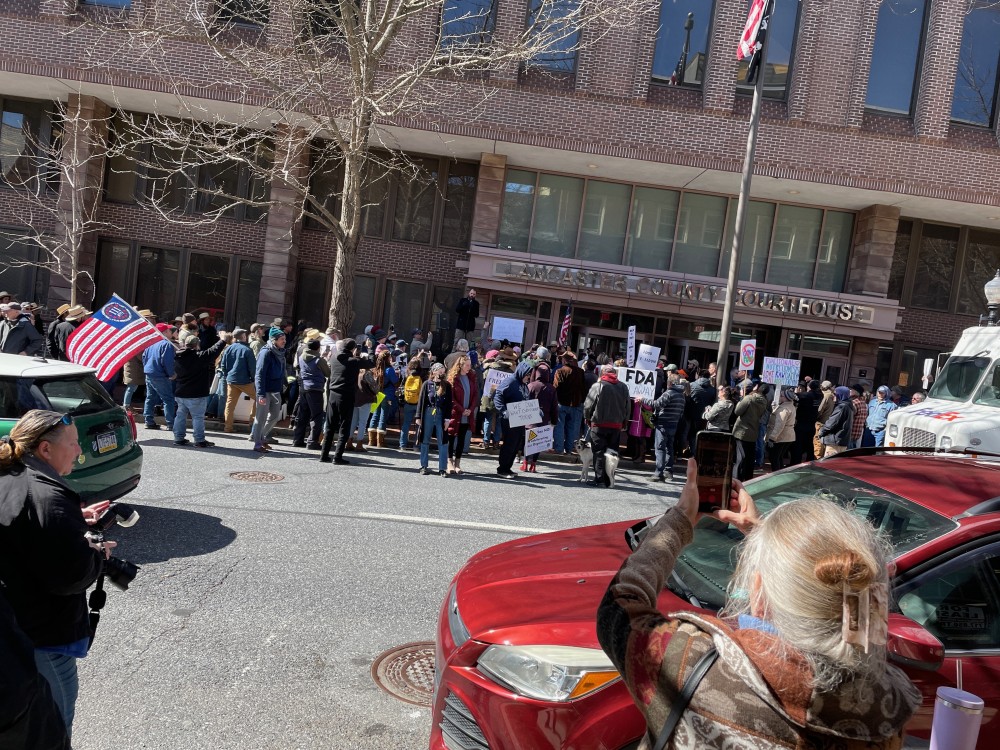At odds with the state, Amish milk farmer has long day in court

Supporters of Amish raw milk farmer Amos Miller gather outside Lancaster County Courthouse on February 29. (PennLive/The Patriot-News)
An Amish raw milk farmer in southern Pennsylvania may have a glimmer of hope to escape an injunction he says will put him out of business and hurt customers all over the country who depend on his products for medical reasons.
For a while on February 29, a Lancaster County judge seemed inclined to extend the injunction, based on the fact Amos Miller has refused to obtain state permits required to sell raw milk and cheese. But at the very end of the hours-long hearing, Judge Thomas Sponaugle seemed open to at least trying to find a path to letting Miller remain in business as he attempts to prove the state has no right to shut him down.
The state did just that earlier this year, obtaining the preliminary temporary injunction after two out-of-state residents became sick from raw milk products the state says came from Miller’s farm.
“If he can’t get any product to anybody for another month, he’s bankrupt and it’s over anyway,” said his lawyer, Robert Barnes.
Still, Miller would seem to face a steep legal climb: Pennsylvania allows farmers who obtain permits and undergo state inspections to produce and sell raw milk and cheese made from raw milk. But it doesn’t permit production and sales of the many other raw milk products that form the core of Miller’s business, including yogurt, eggnog, and products from animals including goats and water buffalo.
At one point, Sponaugle asked, “If this is so important, why doesn’t Amos Miller just get a permit . . . Doesn’t he see in his heart that’s all he has to do?”
He further expressed confidence the state attorney’s office, which made the case against Miller, would expedite the process.
But as Barnes and the lawyer for the attorney general’s office quickly clarified, obtaining raw milk and raw cheese permits wouldn’t clear Miller to sell the other products, keeping him at legal odds with the state.
Barnes, meanwhile, insisted Miller has always been open to working with both state and federal authorities to come into compliance with food safety laws.
At that point, Sponaugle abruptly said he wanted a private conversation with the two parties and ended the public hearing, forcing spectators and the media to leave the courtroom. He gave no timeline but said he’ll quickly decide whether to continue the injunction.
Earlier in the day, dozens of Amish men and women crowded the sidewalk in front of the courthouse in downtown Lancaster. They were joined by many non-Amish supporters carrying signs with messages such as “Food Freedom.” Speakers railed against government “tyranny,” saying state agriculture department inspectors and state troopers who accompany them are “agents” of evil, and that the only valid law comes from God, not the state. One chanted “give me salmonella or give me death”; others handed out containers of raw milk and chunks of raw cheese.
The February 29 hearing centered on extending the injunction the state attorney general’s office obtained earlier this year to prevent Miller from selling raw milk products unless he obtains the required permits.
Miller has been clashing with state and federal agencies since 2016, when the federal government said raw milk products from his farm caused the death of a Florida resident.
Most recently, state officials said two out-of-state children became sick with E. coli after consuming raw milk products believed to be from Miller’s farm.
That led to a January 4 search of Miller’s farm by the state agriculture department, which said it found listeria, another food-borne pathogen, in storage tanks and raw milk products.
Miller has long contended he isn’t required to have permits or undergo inspections, for reasons including the fact he sells to members of a private club who understand he lacks permits, but have come to trust in the safety of his products and the health benefits.
His lawyers say the recent actions by the state have caused “severe economic harm” for his business and hurt customers who rely on health benefits from his products.
They further argue the case against Miller amounts to government overreach and violation of his constitutional rights.
The state says it has long tried to work with Miller to bring him into compliance with the law.
In 2023, Miller paid federal fines and costs of about $85,000 while signing a consent decree agreeing to abide by federal regulations.
At the hearing, the state highlighted evidence it says it collected on January 4, including multiple samples of products that tested positive for listeria, which can cause blood infections and severely harm pregnant women or cause prenatal complications. They presented photos they said show evidence of unsanitary conditions.
Barnes, meanwhile, called a series of Miller’s customers as witnesses. All were from out of state, and all described using raw milk products from Miller to successfully treat severe conditions, including one who said it transformed her autistic child.
He then called a series of experts who argued that raw milk has many health benefits that are destroyed by pasteurization, and that raw milk is as safe or safer than pasteurized milk.
Sponaugle, meanwhile, began the hearing by stressing “he will not legislate from the bench.”
“I’m not here to change the law or manipulate the facts to get an outcome that someone wants,” he said.
At one point, he suggested the logical pathway is for Miller to ask state lawmakers to change the laws regarding raw milk.
Miller, meanwhile, has become a hero among opponents of big government, with supporters donating about $250,000 as of this week. His case caught the attention of vaccine critic and presidential candidate Robert F. Kennedy Jr., who urged people to attend the hearing, which took place inside a well-fortified courthouse. —PennLive





